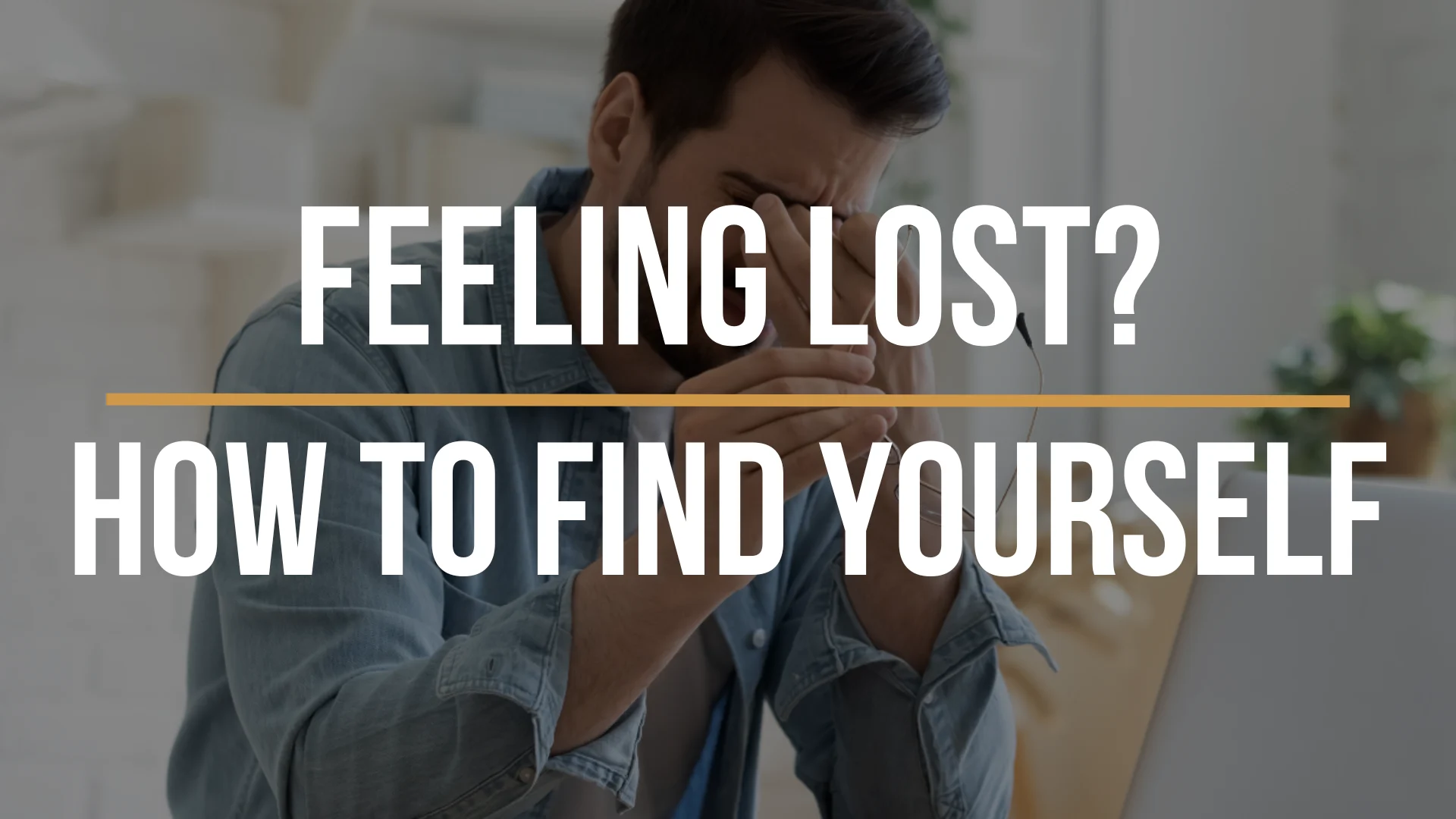Mental Health
Feeling Lost? Learn How to Find Yourself

Feeling lost? Learn how to find yourself with these tips on navigating life’s challenges, discovering your passions, and uncovering your true self.
How can journaling help in the process of finding yourself?
Journaling helps you track your thoughts and emotions over time, providing insight into your inner world. It can reveal patterns and progress, helping you understand yourself better.
Why is it important to challenge negative self-talk?
Negative self-talk can reinforce feelings of being lost. By challenging and replacing these thoughts with positive affirmations, you can create a more empowering narrative about who you are and what you can achieve.
Can trying new activities help me find myself?
Yes, experimenting with new activities can help you discover what you enjoy and what brings meaning to your life. This can lead to personal growth and a stronger sense of identity.
How does reconnecting with old friends contribute to self-discovery?
Reconnecting with friends from a time when you felt more confident can reignite those feelings and help you remember aspects of yourself that you may have forgotten.
What professional resources are available to help me find myself?
Seeking help from therapists or life coaches can provide new perspectives and coping strategies. Professional support is valuable in navigating the complexities of self-discovery and overcoming obstacles.
Feeling lost in life can be like navigating through a dense fog, where every step forward feels uncertain and overwhelming. This sensation often arises from significant life changes, unfulfilled dreams, or societal pressures that steer us away from our true selves.
If you’ve been feeling lost, read on for some tips on how to find yourself. We’ll explore the emotional turmoil of feeling lost, the underlying causes, and the unexpected benefits that can emerge from this challenging experience. And if you’ve been experiencing persistent sadness and aren’t sure where to turn, call us for urgent support.
How Does It Feel to Be Lost?
Feeling lost in life is like being stuck in a whirlwind of emotions – confusion, worry, sadness, and sometimes even feeling like you've hit rock bottom. It's as if your path forward is hidden in a thick fog, and you can't make out where to go. This feeling can come from various life events, like the end of a long relationship, losing your job, facing a major illness, or simply dissatisfaction with something's not right in your life.
Since some people may not recognize when they are going on without any purpose in life, let's go through some telltale signs of feeling lost:
Emotional Rollercoaster: When you're feeling lost, you might feel sad, frustrated, anxious, or even angry. All these emotions can come at you all at once, and it can leave you baffled.
Doubting Yourself: Feeling lost often brings along its friend, self-doubt. You start questioning your abilities, second-guessing your choices, and wondering if you're even good enough. You lose all your self-confidence.
Aimlessness: One of the most obvious signs of feeling lost is a sense of aimlessness. You wake up in the morning without a clear purpose, not really sure where you're going or what you're working towards.
Isolation: Feeling lost can also make you feel isolated and disconnected from others. You might withdraw from social activities, feel distant from your friends and family, and struggle to connect with people on a deeper level. You may start building walls around yourself.
However, feeling lost isn't always a bad thing. It can also be a signal from your inner self, saying, "Hey, something's not quite right here." It's a chance to take a breather, think things through, and start a journey to discover your true self. And in the end, this journey can lead you to a happier and more fulfilling life.
Why You Might Feel Lost
Many of us may recognize that we’re off course from our usual selves but may fail to point out the exact reasons why we feel lost. Listed below are some probable situations that may be making us feel disoriented:
Life Changes
Sometimes in life, big changes happen, like starting a new job, ending a relationship, or moving to a different place. These shifts can leave you feeling like you're in uncharted waters, not quite sure who you are or where you're headed. It's in these moments that you might wonder about your purpose and direction.
Dreams Unrealized
We all have dreams and hopes, but sometimes, reality doesn't quite match up. When your goals and dreams don't come true as you imagined, it can bring a deep sense of disappointment and confusion. The gap between where you are and where you thought you'd be can make you feel like you're wandering in the dark.
Outside Expectations
Society has its own set of expectations – being successful, fitting in, or following a specific path, for example. When you feel the pressure to meet these external standards, it can pull you away from your true self. Trying to fit into a mold that doesn't align with your inner values and desires can leave you feeling like you're lost at sea.
Coping with Loss
Loss can be a heavy burden to carry, whether it's the loss of a loved one, a job, or a cherished dream. Grief is a natural response to loss, and it can make you feel disconnected from yourself and the world. However, grieving is a process, and it's okay to feel lost during such a time.

We’re Here To Help You Find Your Way
Would you like more information about feeling lost? Reach out today.
The Unexpected Benefits of Feeling Lost
At first glance, feeling lost might sound like a nightmare you'd want to avoid at all costs. But sometimes, it can be a blessing in disguise. Let's explore why:
A Catalyst for Change: Feeling lost often acts as a wake-up call, pushing us to rethink our choices and make necessary changes in our lives. It nudges us to step out of our cozy comfort zones and explore new horizons.
Time for Self-Reflection: When you're in that lost state, it's the perfect time to look inside yourself. You get to dig deep into your values, passions, and what truly matters to you. This self-reflection can lead to a profound understanding of who you really are.
Toughening Up: Overcoming the challenges that come with feeling lost can toughen you up. It's like a boot camp for resilience and adaptability. You learn from your mistakes and come out stronger.
Finding Your Authentic Self: Feeling lost can help you peel away the layers of societal expectations and uncover your authentic self. It's a journey toward living a life that's unpretentious and true to your inner self rather than conforming to what others expect of you.
How to Find Yourself
Now that we've talked about why feeling lost can be a valuable experience, let's explore some actions you can take when you feel lost:
Be Aware of Your Emotions: The primary goal is to acknowledge and accept what you're feeling. Feeling lost is a common human experience, and there's no need to feel ashamed or hide your emotions. Give yourself permission to feel the full range of emotions that come with it.
Take a Breather and Reflect: Use this time as an opportunity to reflect on your life. What areas of your life leave you feeling lost or unfulfilled? What truly matters to you in terms of your values, dreams, and passions? Write these thoughts down to create a clear picture of what you want.
Lean on Others for Support: You don't have to make this journey alone. To get advice, understanding, and a listening ear, turn to friends, relatives, or a therapist. It can be calming to express your emotions, and offer some clarity.
Start with Small Steps: Start small. Begin with manageable aims that line up with the newfound clarity you're gaining about your life. These small goals can serve as stepping stones toward a more satisfying future.
Be Flexible: Don't be afraid to move outside of your comfort zone and explore new things. Sometimes, you'll only discover what truly resonates with you through experimentation.
Learn from Setbacks: Understand that setbacks are a natural part of the journey. Instead of seeing them as failures, view them as valuable learning experiences that will ultimately lead you in the right direction. Every mistake can bring you closer to finding your way.

We’ll Lead You to New Heights
Do you have more questions about feeling lost? Reach out.
Discovering Your Passion
Feeling lost often stems from a sense of not knowing what truly excites and satisfies you in life. The process of finding your passion is not always straightforward, but it's a vital step towards finding your way. Let's explore some steps that can help you uncover what ignites your enthusiasm and brings meaning to your life:
Explore Your Interests
Firstly, it's crucial to explore your interests. Take a moment to think about the activities that make you lose track of time. What could you happily do for hours on end without feeling tired or bored? These clues often point the way to your passions. Another valuable avenue is to reflect on your childhood dreams. Sometimes, our earliest aspirations hold hints about our true passions. Think back to what you wanted to be or do when you were a child. Is there a way to incorporate those dreams into your adult life?
Connect with Others Who Inspire You
Engaging in conversations with passionate individuals can also be enlightening. Speaking to people who exude enthusiasm for their work or hobbies can inspire you and offer insights into how you might discover your own passions. And don't shy away from experimentation. Trying new things is a fantastic way to uncover your passion. Consider taking up classes, attending workshops, or volunteering in different fields to gain exposure and see what resonates with you.
Your inner voice and intuition can be powerful guides in this journey. Pay attention to your gut feeling and instincts. Sometimes, your inner voice will lead you towards your true calling.
Be Patient With Yourself
Last but not least, be patient with yourself. Finding your passion may not happen overnight. It's okay to take your time exploring, experimenting, and learning along the way. Remember that this process is about self-discovery and growth, and every step brings you closer to uncovering your passion and purpose in life.
Rediscovering Your True Self
Feeling lost often comes hand in hand with losing touch with who you really are. Rediscovering yourself is an integral part of creating a more grounded and rewarding life.
Practice Self-Compassion
First and foremost, practice self-compassion. Be gentle and kind to yourself during this process. It's important to avoid harsh self-criticism and judgment. Remember, you're on a journey of self-discovery, and it's absolutely okay to make mistakes along the way. Mindfulness practices and meditation can also be immensely beneficial. They help you connect with your inner self and gain clarity about your thoughts and emotions. By being more present in the moment, you can better understand yourself.
Assess Your Core Values
Take some time to uncover your core values. What principles and beliefs matter most to you? Aligning your life with these values can bring you a profound sense of purpose and fulfillment. Consider keeping a journal. Journaling can be a powerful tool for self-discovery. Write about your thoughts, feelings, and experiences. It not only helps you express yourself but also allows you to track your progress and identify patterns in your life.
Break Free From Expectations
Another important step is letting go of expectations. It's time to release the expectations and judgments imposed by others. Rediscover what genuinely makes you happy, regardless of societal pressures or norms. And, as you progress on this journey of rediscovery, remember to celebrate your achievements. No matter how small they may seem, each step forward is a victory in itself. Recognizing and honoring your progress can boost your confidence and motivation.
Indulging in Self-Care and Building Resilience
When you're feeling lost, it can take a heavy toll on your emotions. That's why you must make self-care a priority and work on your resilience.
Self-Care Routine: Create a self-care routine tailored to your needs. This routine should include activities that nourish your mind, body, and soul. It could be something as simple as daily exercise, practicing meditation, losing yourself in a good book, or spending quality time in nature. These activities can help you find balance and regain your sense of self.
Surround Yourself with Positivity: Surrounding yourself with positivity is another essential step. Seek out people who uplift and support you. Positive relationships can be like a sturdy anchor during times of indecision, helping you stay grounded and connected.
Stay Open to Learning: Embrace a growth mindset and remain open to continuous learning. The more knowledge and skills you acquire, the better equipped you'll be to tackle challenges that come your way. This mindset shift can empower you to navigate the unknown with confidence.
Practice Gratitude: Cultivate a sense of gratitude for the small joys and blessings in your life. It's a powerful tool that can shift your focus from what's lacking to what you already have. Practicing gratitude can help you find contentment even in challenging times.
Set Boundaries: Setting boundaries is another act of self-care. Establish healthy boundaries to protect your emotional well-being. Learning to say "no" when necessary is a crucial part of self-preservation.
Seek Professional Help: If you find that your feelings of being lost are overwhelming and persist, don't hesitate to seek professional help. A therapist or counselor can provide you with guidance and tools to help you navigate this journey toward rediscovering yourself. Remember, reaching out for support is a sign of strength, not weakness.

We’re Here To Help You Find Your Way
Do you need advice about feeling lost? Reach out today.
Closing Thoughts on How to Find Yourself
Feeling lost is a common human experience that can serve as a powerful catalyst for personal growth and self-discovery. By acknowledging your emotions, reflecting on your life, and seeking support from others, you can navigate through this challenging period and emerge stronger and more aligned with your true self.
Remember, setbacks are part of the journey, and each step you take brings you closer to finding your way. If you’ve been feeling lost and believe your mental health is suffering, know that help is available.
Feeling Lost? We’re Here to Help.
The Edge Treatment Center has the expertise and resources to treat a wide range of mental health conditions. Our dedicated team is here to support you on your journey to healing. Call us today to take the first step toward finding yourself and reclaiming your life.

We’re Here To Help You Find Your Way
If you or a loved one is struggling with addiction, there is hope. Our team can guide you on your journey to recovery. Call us today.
Written by
 Brian Moore
Brian MooreContent Writer
Reviewed by
 Jeremy Arzt
Jeremy ArztChief Clinical Officer
Mental Health
October 7, 2024
